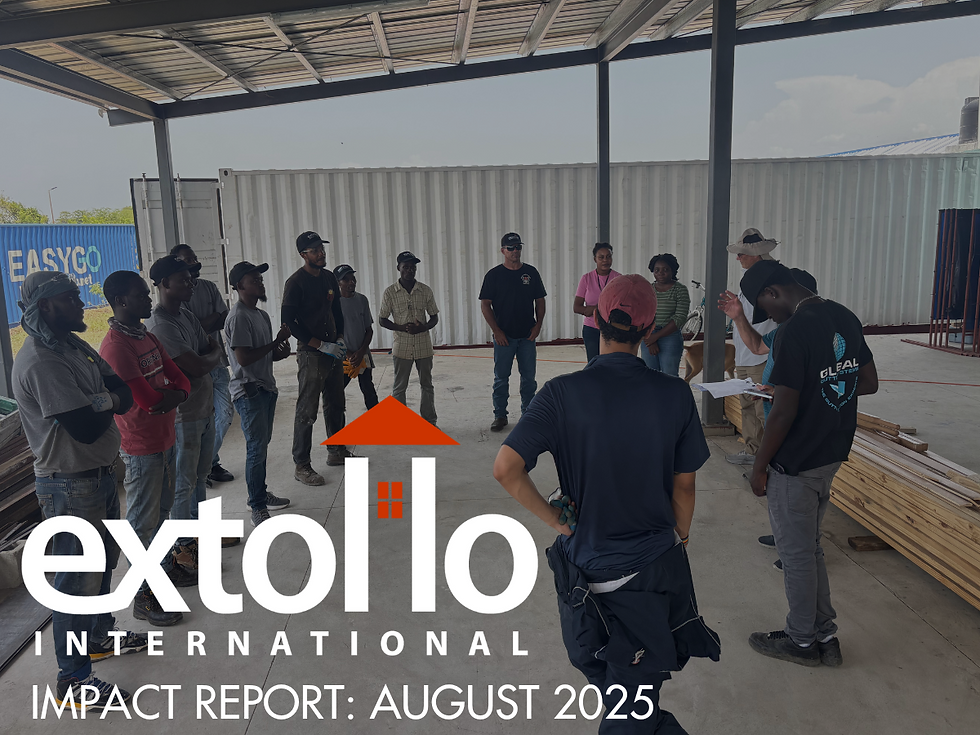After relief efforts, a solution
- Keith Cobell
- Aug 25, 2021
- 4 min read
Updated: Sep 4, 2021
While we do all we can to help during an emergency, Extollo is not a disaster-relief organization. Our focus is long term, sustainable change through skill development in the construction trades, economic development through jobs in the construction industry, and bringing earthquake-resistant homes to the housing market - particularly to those who need them the most. Thus we are working hard to prevent innocent lives being lost to the next natural disaster in Haiti.
We are proud of our team member, Carlos, who temporarily worked with the US Coast Guard and other branches of the US military involved in the rescue efforts after the earthquake in Haiti. Carlos was at the epicenter of the earthquake, serving as an interpreter and logistics support, assisting the US military’s broad rescue efforts. We are happy Carlos was able to help the US military and we are proud to be, in a small way, part of the rescue efforts.

Carlos is a good example of Extollo’s approach to Haiti: willing to help in any way during a natural disaster but primarily driven to build and train so that the reason for so much death is prevented in the first place.
The 7.2 earthquake that struck southern Haiti on Aug. 14, leveling homes and other structures with people still in them, made it brutally apparent that Haiti’s normative construction techniques and re-construction plans will not prevent another disaster of this nature from happening again and again.
The January 2010 earthquake that hit a much more populous part of Haiti and killed an estimated 200,000 to 300,000 people made the world aware of the dangers of shoddy construction techniques and almost non-existent building code enforcement. This latest earthquake brought to light that the core problem still remains. A recent article in National Geographic (“Here’s what makes earthquakes so devastating in Haiti”): https://www.nationalgeographic.com/science/article/heres-what-makes-earthquakes-so-devastating-in-haiti) makes this point very clear:
Both quakes are part of Haiti’s long history of shakes, which results from the island nation’s position at the edge of the slowly shifting Caribbean plate. The movements build stresses in a network of fractures that crisscross the island, which occasionally release pent-up stress in ground-rattling earthquakes. While the region’s quakes are not the most powerful in the world, their deadliness is magnified by Haiti’s abundance of concrete and masonry buildings that were not built to withstand earthquakes.
It is exceedingly difficult to build structures resilient to natural disasters in a context like Haiti. Extreme poverty, and the inability to afford quality materials (or even afford the correct type of materials at all), is a significant contributor to the problem. When you simply need a roof over your family’s head, you use whatever you can find. On top of this, the know-how of basic construction practices and standards is oftentimes missing. Haiti has building codes that meet international building standards but with no real inspections or enforcement, corners are cut, resulting in substandard buildings that cannot hold up to the strain of natural disasters.
(photos taken by Winston Powers)
We believe that the future of Haiti is Haitian - and a stronger Haiti should be (and is) in the hands of Haitian men and women with the skills to build structures resilient to natural disasters of any kind.
Our mission is to help ambitious men and women in Haiti lift themselves out of extreme poverty through skill acquisition, character development, and economic opportunity. “I started Extollo because what Haiti needed the most after the 2010 earthquake are people of character and competency who can build structures that can stand up to natural disasters’” states Extollo founder, Sherman Balch. “The next stage is to give Haitians not just skills but a whole new way of building that can ensure quality and resiliency.”
Extollo is embarking on an ambitious venture to be the “first-mover” of tilt-up construction in Haiti. Leveraging Balch’s expertise as an innovator of tilt-up construction technology, Extollo is currently developing operations to produce a panelized, earthquake-resistant house. And as the first-mover of this construction technology in Haiti, Extollo will also create a specialized training program specific to tilt-up, to develop Haitian construction leaders and a capable tilt-up construction workforce. Carlos, our team member mentioned above, will be a key member of the tilt-up construction team - building houses that will withstand natural disasters and protect the people inside them.
The panelized house, because of its design and use of tilt-up concrete walls, will meet or exceed California seismic requirements as well as being LEED Platinum certified, while using materials and other inputs easily accessible in Haiti. Extollo is developing its tilt-up operations to fabricate the wall and security fence panels on its campus in Bercy and also developing operations to be mobile: able to relocate the concrete mixing and pouring operations to different job sites depending on the scale of the job. As a sign of the need and market demand for quality, affordable housing, the government of Haiti projects that hundreds of thousands of homes will need to be built in the coming years.
We are grateful that God has led us to Haiti for such a moment as this: to help in the relief efforts - and to bring an innovative, long-term solution to one of Haiti’s greatest needs.




















Comments